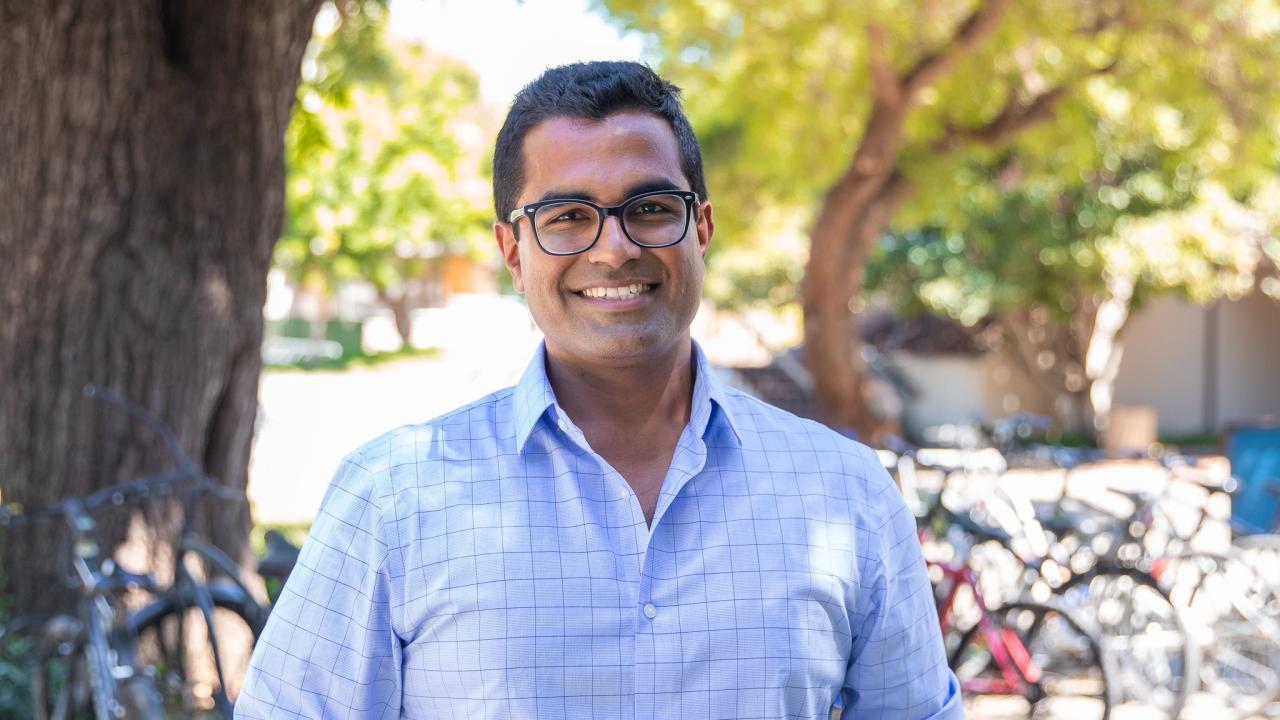
Harishankar Manikantan: Flowing Through the Field of Complex Fluids
New assistant professor Harishankar Manikantan is a researcher and teacher in all senses of the words. With a background in three different disciplines and a passion for outreach and mentorship, he joins the Department of Chemical Engineering to advance the field of complex fluids and teach the public about the physics behind the gels, foams and other complex liquids we use every day.
“The most fulfilling part of my research is not just the ‘a ha’ moment of discovery, but passing that on to my students, my colleagues and the community,” he said. “The enlightenment that comes out of it is very rewarding for me.”
Manikantan studies complex fluids, or “liquids with stuff in them,” which encompass everything from coffee to cleaning products to shampoo to blood. On their own, they’re pure liquids like water or alcohol, but the added “stuff” transforms their properties and texture and turns them into unique substances.
“A liquid flows off your hand, but hand sanitizer, which is mostly alcohol, has a very little something added to it to make it goopy so it can be held without flowing,” he said. “That added something makes it complex.”
Manikantan’s broader research interests fall under the area of soft matter, a relatively new field of study born out of the traditional fields of fluid mechanics, solid mechanics and thermodynamics that uses pieces of each. His focus is learning how adding “stuff” to fluids changes its properties depending on its size and shape and the fluid it’s in.
“There’s a certain beauty to the mathematics of fluids,” he said. “So many applications hinge on a fundamental understanding of what would seem like basic physics, but leads to really surprising results and powerful and intuitive tools in engineering.”
Manikantan can apply these tools to engineer better food, cleaning and foam products, as well as develop more efficient and sustainable transport systems for wastewater treatment and drug delivery in blood.
Sitting across different fields
Manikantan approaches complex fluids from a unique perspective. Though he is a chemical engineer by trade, he studied mechanical engineering as an undergraduate at the National Institute of Technology—Karnataka in India and applied mechanics for his Ph.D. at UC San Diego before moving to chemical engineering for his postdoctoral work at UC Santa Barbara.
“All of these communities look at the same problem with a different language, but on the other hand, there are gaps in each of them,” he said. “My contribution comes from my unique position sitting across these disciplines and using these insights to tackle some of these problems.”
To do this, he looks forward to collaborating with his new colleagues in chemical engineering and across the College of Engineering who are working in complementary fields.
“UC Davis Chemical Engineering is fertile ground for me in terms of collaboration,” he said. Nearly every industry has some sort of fluid processing unit, so his research has the potential to span numerous industries and disciplines.
All-around educator
Manikantan is excited to join UC Davis not only as a researcher, but also as a mentor.
“I think mentoring students is one of the greatest things a university can do,” he said. “I’m looking forward to working with students and helping them discover how to be the best engineer or scientist they can be.”
While he was in graduate school, he was heavily involved with high school outreach—something he hopes to continue at UC Davis. He sees himself as a teacher in all senses of the word, hoping to teach the public, as well as his students, about the physics behind products people use every day.
“I think it’s crucial for all of us, as scientists, to learn how to communicate better,” he said. “If I can convey my enthusiasm to people in my interactions, I feel very satisfied.”
In his spare time, he bakes, makes pottery and enjoys spending time in nature. He’s especially excited to have easy access to the UC Davis arboretum. “[When I was weighing job offers,] I think the walk in the arboretum with my wife might have sealed it,” he said.
Manikantan began July 1 and will set up his research group this fall.
